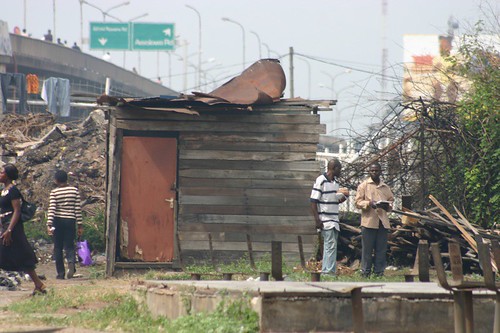PORT HARCOURT, Nigeria — If there’s one thing Nigerians can agree on it’s their affinity for the “Crocodile Hunter.” Everywhere I went in the country televisions were tuned to the Animal Planet channel, which more often than not aired reruns of the late Steve Irwin.
During my weeks-long assignment in the poverty-stricken and often violent West African country, I watched Nigerians marvel as Irwin handled a venomous snake from the African bush, inspected the toes of an aged land tortoise in the Galapagos Islands, and of course, wrestled a crocodile from his native Australia.
Good drama, for sure, though why the late-TV outdoorsmen is so compelling to Nigerians remained a mystery to me.
I was trying to answer more ominous questions. For example: Why do more than 70 percent of Nigerians earn less than a dollar a day while foreign oil firms extract billions of dollars worth of oil and gas from the country every year?

Though their country generates billions of dollars in oil revenue, many Nigerians live on less than one dollar a day.
Obvious answers are often the right ones when it comes to yawning economic divides in developing countries, and Nigeria is no different. Nigeria’s political leaders are among the most corrupt in the world. According to Transparency International, Nigeria consistently ranks among the worst offenders, sharing the 142nd spot with countries like Sierra Leone and Pakistan.
But what makes Nigeria’s leadership even more deplorable is that they don’t seem to mind being at the bottom of the corruption barrel as long as petrodollars earmarked for better schools, clean water and security are being channeled into their private coffers for multimillion dollar homes, luxury cars and just about any other ridiculous luxury good you can — or even can’t — imagine.
“That house, across the street, the owners have a lion as a pet,” the bartender at my hotel lounge in Port Harcourt told me while we watched a couple of lions devour a zebra, the Crocodile Hunter providing color commentary laced with his trademark “Crikey!”
Reputed to belong to a member of the petroleum ministry, the house in question was surrounded by a 12-foot wall topped with razor wire and looked like it had at least a dozen bedrooms.
There was no way for me to confirm the rumors about the resident King of the Jungle, but the lavishness of the home and many others like it in Port Harcourt was a clear indication that some were benefiting a great deal more than most from the oil biz.
Since the 1970s, Africa’s largest oil producer has pumped more than $300 billion worth of crude oil from the southern Niger Delta states, of which Port Harcourt is the de facto capital. With that much bubbling crude spilling forth its lucrative bounty you’d think the southern Nigerian city would resemble Beverly Hills rather than Bangladesh.
But outside the protective walls of mansions, the city is squalid. The stench of stagnant, raw sewage filling open sewers along the streets of Port Harcourt is nauseating. A persistent cloud of toxic exhaust emitted by buses and trucks burns the eyes and throat. Though potable water for everyone is a supposed goal of the government, taps flow dun-colored and reek of rotten eggs.
Electricity in Nigeria’s petroleum capital is unreliable at best, forcing businesses and homeowners who can afford them to switch on gas-powered generators that further blacken the city’s already toxic air.
Though President Olusegun Obasanjo has spent the past eight years promising a crackdown on corrupt politicians in the delta and elsewhere, there is little evidence of any real effort. The governor of Rivers State, home to Port Harcourt, is Peter Odili, considered by many here to be the worst perpetrator of theft from federal coffers despite hailing from Obasanjo’s ruling People’s Democratic Party.
The governor’s estate is a compound rivaling the White House grounds in size. Its two-story walls block from view the grim reality of life for poor working-class residents of the delta, whose fishing waters and farmland have been fouled by oil spills.
Loss of income and persistent joblessness in the delta help give rise to armed militant, criminal and even cult groups that attack oil installations and kidnap foreign oil workers, curtailing production by up to 25 percent.
The gunmen’s anger is born of their frustration with elected officials too greedy to spread the oil wealth by building adequate schools, hospitals, housing and infrastructure in Rivers State.
“There is visible evidence of corruption everywhere,” Muhammadu Buhari, a former military regime leader and former presidential candidate, said in an interview with World Politics Review ahead of the April 21 elections.

Supporters of former presidential candidate Muhammadu Buhari rally at a park in downtown Port Harcourt. Buhari contends that the current crop of Nigerian leaders is responsible for the recent outbreak of militant violence.
Buhari and others blame Obasanjo allies like Odili for arming the Movement for the Emancipation of the Niger Delta and other militant groups in order to intimidate political opponents. But that tactic, he says, has backfired against the administration now that the militants have apparently turned against their former benefactors.
According to one militant leader who spoke to World Politics Review, the forces that once allegedly did the bidding of corrupt officials now are prepared to do whatever it takes to right some wrongs in the delta, even if it means dying in the process.
So in addition to being an environmental disaster where corruption goes unchecked, the Niger Delta is also quickly becoming a war zone, where escalating violence means more suffering for Nigerians caught in the middle.
It’s perhaps no wonder, then, that Nigerians are enamored with the Crocodile Hunter: A man who enthusiastically and routinely faced physical suffering and death and emerged unscathed — that is, until he didn’t.
